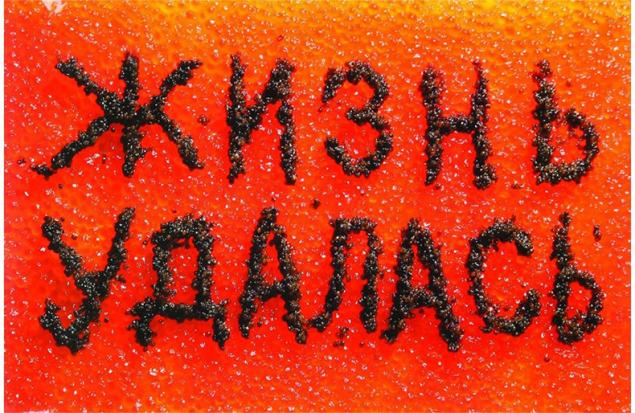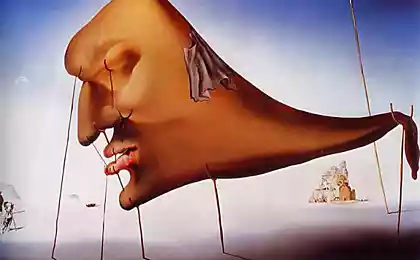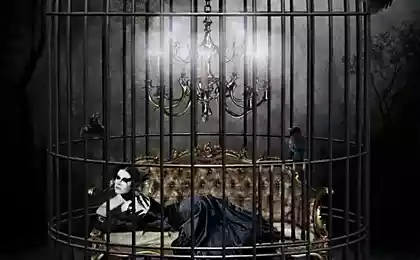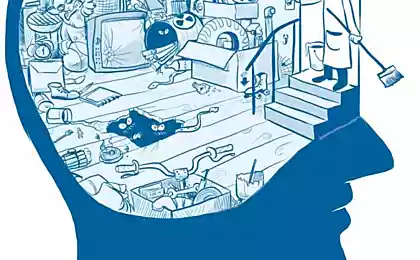718
About the Fees and Payments 4 or attitudes
Everything in this world is not new,not rolled cardoctor each sees the patient,sees Fire everywhere fire.The pilot sees the blue sky,the Guard sees the enemy,the traveler sees the land where he was not only the fisherman of the fisherman sees all the Drinking, not drinking,Cat everywhere smells of mice,the Opera imagining the killer,the Killer everyone is a target.The lawyer sees every client,the Attorney everyone is a Convict,an electrician sees a blue ribbon,And only birds of a feather... (a time Machine. "Birds of a feather")
Remember the song by Sergei Shnurov "no pity"? It has these words:
We are all the hero of movies about war,Or about first flight to the moon Or about life of lone hearts,each movie your end... have You ever wondered why each of us has our own "film" (short film in one huge movie of life), its role and, most importantly, the end of history? Why everything in life as in the poem by William Blake "the Sayings of innocence":
On a dark night and a little Svetlov will be Svetlov will be light around the darkness of the night...And one waiting for happiness to light the misery of the darkness If we are to believe E. Berne (and his followers), then any adult has its own, different from others, life script, which is based on a certain position in life. Position in life – is a collection of basic ideas about yourself, others and the world, which are designed to justify decisions and behavior.

Because our brain works on principles similar to a computer, to any user, it is obvious that the machine could give only the result, the receipt of which has been predetermined by the program on input. From my parents we got the motherboard (physiological characteristics, etc.), else "loaded" after the birth. Five years before your computer is booted, and then begins to function independently (relative to your own!), complementing, gaining new and improving their software.
The Luggage people and builds its relationships with the world in the framework of a particular life script and life position is a "blank" (the draft or procurement) of this scenario. People, of course, is not the mechanism, but very much in our lives depends on the "source" is the basic stance.
These four positions:
Which of the attitudes best for you?
1. You think that "Life is worth living."
In your life everything is good and overall you are surrounded by wealthy people. You to easily establish and maintain relationships, you do not irritate the mistakes of others, you are tolerant of the faults of others. I feel quite self-sufficient, internally free and happy. In addition, you do not think that you are better or worse than others. You just live and rejoice.
2. You think the right slogan: "the Lives of others worth living, my life is not worth living."
All around happy, satisfied with life, but with you something is wrong. Well that sucks. No matter how much I try — not going...You feel uncertainty in the forces, tend to fall into dependence on other people who have the power and recognition. You periodically experienced the envy of other people's successes and feeling of worthlessness.
3. You like the slogan: "My life is much more valuable than the lives of others."
You sure deserve the best. Most people are not as good as you. They (unlike you) has many flaws, which they need to get rid of. It is important for you at any cost to prove his innocence, point out other people's mistakes, to emphasize their superiority.
4. Do you prefer the slogan: "Life is not worth living."
All bad. With you, with others and with the world in General. Life is full of disappointments. You live with the feeling of complete helplessness. There is no strength and desire to change something, it seems that the best will never be.
Recognize yourself? Let's think about why it is that way.
How is our "picture of the world"? Under the influence of what (who) some of us decide that the world is a huge buffet where everything is and have the status of "all inclusive", while others truly believe that the world is a battlefield in which they have no chance to survive?
According to Claude Steiner, before the birth of any child formed some basic ideas, subsequently defining his attitude to life in the broadest sense of the word (and the life). The idea of how prosperous he is, how successful others are and how prosperous the world in which he will live.
Kovalev believes that "the vast majority of children to birth this position corresponds to the ideal version of "all is well": I, others and the world (rare exceptions are those who wanted to kill in the womb, an abortion; or pregnancy which occurred with severe pathologies). But then, the trauma of birth, parental programming and the impact of significant others, leads the main position in life came into this world changes, and after recorded".
T. E. Harris, building on work of Adler and Sullivan, says that the first child begins "I am dysfunctional, You're safe", and as the only possible one. It is relative then it is building up comparative assessments, which form the basis for the final installation of an adult. Thus, initially we are all weak and helpless victims, "thrown" into the world, and dependent on others.
According to Harris, the following formed the installation "I am dysfunctional, You're dysfunctional" when the child discovers that it is not always understood and accepted. Then he concludes that with others that something is wrong, not right. And brings this conclusion to the world (troubled world).
According to Harris the third "I am prosperous, You're dysfunctional" is formed on the second or third year of life. While it is mostly typical for children exposed early to violence. To save his life after the atrocities, the child pulls away from others, blaming them for their suffering. "I am prosperous! You – no," he said to his torturers.
Harris: "By the end of the third year of life some of these three units is fixed each person. They are born from emotions and little influenced by information coming from the outside, which could change".
Harris believes that unlike the previous three, the fourth installation of "I am prosperous, You're safe", conscious and verbal feature. "It is based on thought, belief and desire to action. It not only allows for the adoption of a greater amount of information about themselves and others, but also includes records not yet experienced feelings that are embodied in the concepts of religion and philosophy" (Harris).
I think, without going into details, we can say that we are all born winners by virtue of the fact that all came to light – won oblivion. And, of course, no one will argue with Harris that to install "I am prosperous, You are prosperous" you can come consciously.

Let's take a closer look at each of the four life positions:
Let's start with the installation "I am prosperous, You're safe".
This position corresponds to the position of "the main (basic) trust," described by Eric Erikson, which is a "such a state of Affairs in which the baby feels that he lives in harmony with the world and everything in the world is in harmony with him." First of all we are talking about the interaction with the mother, because up to a certain period, the mother is the whole world of the child.
On how to care for them in infancy, children learn do you the world of confidence. If their needs are met if they are treated with attention and care and treat them pretty consistently, children have formed a General impression of the world, as the place is safe and trustworthy.
Those few people who have managed to maintain a fixed emotional attitude "I am prosperous — the other wealthy" anything in particular to say and no need first, they are, as a rule, any psychological help is not needed, and secondly, there really just very little. They are the lucky ones (Winners). Those who live by the principle: "Live and be happy". The world for them – in General an infinite Sunny day, and even if the clouds will close the sun, they know what the sun was, is and will be.
They are confident in their abilities, no doubt that will succeed (and in fact for success necessarily requires faith in his ability), if you are facing difficulties, then think: "Yes, my life battered, beaten. But "all that does not kill us makes us stronger" (F. Nietzsche) and continue to go for their goals (which is their goal, they define themselves), it's not that Winners never make mistakes, but they are able to learn from them:
Autobiography in five short chapters
Chapter one
I walk down the street.In the pavement a deep pit. .I spill into her.I'm lost, I'm desperate.But it's not my WinAmp it took forever To get out.Chapter two
I walk on the same street.In the pavement a deep pit.I pretend not to see her.I'm falling into it again.I can't believe I'm in the same place.But it's not my fault?I still require a lot of time to get out.Chapter three
I walk on the same street.In the pavement a deep pit. I can see it.I still fail at it...... it's a habit, my noglsa open.I know where I am.It's my fault.I get out immediately.Chapter four
I walk on the same street.In the pavement a deep pit.I get around it.Chapter five
I walk down another street.
(P. Nelson)
Winners trust themselves and the world (the secret psychology of the winner is simple: the basis of this psychology is the habit of positive thinking). The miracle lives there, where believe in it.
The winners of the "breathe love":
Like breathing ball, where angels and Pricilla over the planet blue...(Y. Moritz)
They know that:
In what may be the pit You shall pay ljubljani,Lubliani and only liblame-Otherwise you will be a slave,Hunted, beaten, autimobile, vulgarity, Bitoni all that is happening around...(J. Moritz)
They love life and she often reciprocates their feelings...
And what happens with the rest?
Why do most children change their position? Why the world is for many an endless night?
The child changes the position only in case, if something interferes with its interactions with the mother, for example, when a child feels that the mother ceases to protect him and care for him as she had done earlier. In response to adverse circumstances, the child may decide that he is not prosperous or that other people are not prosperous, coming from a state of basic trust in the fundamental state of disbelief.
For example, one takes as the main existential positions, the principle of "I'm dysfunctional — the other wealthy".
There is change:
So ancient people believed that certain rituals can bring rain. But, gradually convinced that really nothing depends on him. For example, my mother believes that to a crying child should not be treated (even used to be one), or she becomes adept at feeding on the clock (and then scream, do not scream, you are feeding when considered necessary).
Beginning to walk, infants are discovering their bodies and how to control them. When the child cannot do anything independently, he gains a sense of self-control and confidence. But if the child is constantly failing and being punished for it or called sloppy, dirty, incapable, bad, he gets used to experience shame and doubt their own abilities.
Sooner or later many frustration the child's needs find their expression in the feeling of helplessness and uselessness itself ("I am not safe") when a full or relative recognition of well-being determine his life and control it all-powerful adults ("the other wealthy").
"People with existential position of "I - Other+" usually "start in life", with his parting words "be Not" (healthy, happy, successful, etc. etc.)" (Kovalyov).
People with such a vital installation – dependent on others. The most exciting and pleasant feelings come to them from the outside world, it is difficult (sometimes impossible) to find pleasure within yourself.
"I - Other+" is a children's position, is inadequate for an adult. The difference is that in the norm the child is receiving the support it needs developing and improving, and dependent adult parasite on the partner without learning to do without the other.
After all, if your survival requires other people, it means that in your relationship there is no choice, no freedom. This is not love, but a necessity. Two people love each other if they are quite able to do without each other but choose to live together. Addiction is the inability to experience the fullness of life and to act without care for the partner.
"Dependency in physically healthy people pathology. Of course, every person, no matter how adult and Mature he may be, wants at least sometimes to be the object of someone's worries and would like to have in my life some exemplary personality with maternal and/or paternal features. But these desires and feelings most people are not dominant and do not determine the development of their individual life.
If they run your life and dictate the quality of your existence, then you have addiction. People suffering from such violations, i.e., passive dependent people are so intensely trying to be loved, that they are no longer able to love.
They are like starving people, which are constantly everywhere and beg for food and never have plenty to share with others. As if hidden in them a kind of emptiness, a bottomless pit that cannot be filled. They have never a feeling of completeness, fullness; on the contrary, constantly beating the idea: "Some part of me is not enough"" (peck. M. S.).
Dependent cannot stand alone. Because of this incompleteness they really do not feel like a person; in fact, they determine identificeret itself only through relationships with other people. Accordingly, their relationship with a partner, with all the drama appear to have a remarkable emptiness.
A strong sense of inner emptiness and need to fill it cause the thought of losing another so terrible that people with a life position of "I - Other+" can not tolerate actions that reduce the vulnerability and increase the liberty of another.
Inner sense of emptiness is a direct result of the fact that their parents failed to satisfy the children's need for love, attention and care. If a child grows up in an atmosphere where do not exist or occur too rarely and inconsistently – love and care, and the adults he will continue to experience internal uncertainty, the feeling "I'm missing something, the world is unpredictable and unkind, and I myself, apparently, are not particularly valuable and not worthy of love, so to survive I need to find someone stronger who can take care of me".
Dependent person constantly fights where he can, for every little attention, love or care, and if it finds one, it latches onto them in despair, his behavior is not loving, but manipulative and hypocritical, he destroys relationships, so would like to keep.
He clings to outmoded relations which are long overdue break. There's nothing worse than allowing yourself to be dependent on the other person is the worst thing that can be done about it. No matter how cynical it sounds, but it's better to be addicted to substances. If you are an alcoholic, the alcohol won't let you down. If it is, it will always make you happy.
But if you expect that you will make happy another person, then you have to endless frustration. In fact, it's no accident that the most frequent deviation from a passive dependent people (in addition to their relationship with other) is dependent on alcohol or other drugs.
Are people "getting used". They get used to the middle, suck out and devour them, and if others do not exist or are not given, as a substitute is usually chosen by the bottle, needle or powder. Such people aimed to take, not give.
Dependent relationships contribute to infantilism, not development, are the trappings and bondage, not liberation. Dependent people, like, tie your heart to another, and when the other moves away, it "breaks" their heart to the quick, when he goes, it seems to them that they die. And literally dependent "people is that "I - Other+" I often see the solution to their problems in suicide" (Kovalyov).
This does not mean that, faced with a serious problem, people immediately begin to look for a rope, a stool, a nail and a piece of soap ("Hello scented soap and a rope fluffy"). Suicide can be very extended in time and take place in any sphere of human life.
For example, the same alcoholism is a "perfect" way to long-term and not devoid of a certain "pleasure" of suicide. In all spheres: social, because with high probability the person will gradually sink to the bottom; professional, as the work surely, sooner or later kicked out; family, since the partner is likely to go; and, of course, the physical, the body would not last long.
Sometimes (but much less) that a person adopts another basic existential position: "I'm happy — other disadvantaged".
Usually this happens because of two reasons:
Kovalev believes that people with the setting "Me+ Others" received the basic instruction of the parents "don't get too close", which can only be made on the basis of the scenario "a life without feelings" (living without them, and becoming doomed to loneliness).
Contacts with such people are "toxic". In large doses, daffodils are poisonous and carcinogenic. They destroy other people. The daffodil is a bright and ambitious egocentric who Express feelings of superiority, grandiosity, bordering on delusions of grandeur. Paradoxically, the bright "packaging" hides emptiness, lack of self-sufficiency and anxiety. It's the people that hide their own vulnerability, not only from others but from themselves. They win others, "captivate" its charm, and then ruthlessly manipulated by a "captive".
They're like – how addroom – scraps and bits of...(Y. Moritz)
They like to dominate, to play with feelings of others (usually people with a strong sense of guilt and shame), approaching, distancing them from yourself and then when you're done, discard them as useless, emotionally squeeze dry completely. They see humans as objects that you can use to your advantage. Daffodils inside a cold block of ice, they are not able to experience warm feelings to anyone. Their life is the theatre of one actor.
The show ends as soon as turn off the camera and the audience disappear. They keep other people at a distance. Distance is their defensive reaction, which they try to avoid new injuries and disappointments. Not surprisingly, their relationship lasted for a short time. They are afraid of addiction.
Internal hole, they're filled with admiration of the crowd, feeding off the emotions of others, using them as fuel for his Grand stake. To admire the idol's easier at a distance. Well, "if anyone still wish to get closer, thereby creating a problem, there is always the exit door: killing" (Kovalyov).
It is possible to kill not only the bodies of men. The killer may not even know that it is them. It can be dispassionate, indifferent to all surrounding people, who with purpose or without it weighs like a tank other people's feelings. Just someone out of his joy or pain — Bang, someone's sarcastic words, and crushed the spark of faith in man. Narcissus – a man — killer.
...He will fill you with dirt,He thinks you're a scum...(A. Lonchakov)

Finally, even more rarely, but still happens that the person adopts another — the most hopeless existential position: "I disadvantaged other disadvantaged".
The emotional attitude the hopeless despair and devastating the soul of impotence, when all that's left, only to fall, "sink" then, sinking to the bottom, doomed and wait, when all this is finally going to end.
The last of the four existential positions – "I - Others" of course, can result in the losing scenario (his own life – as if defeated in this life). This is the depressive position – the most futile of these.
We are talking about a situation similar to the moment when the child in the womb feels the lack of oxygen surrounding it (prior to this such a soft and serene!) space is compressed, pressure. The kid would be glad to get out, to fight, but the exit from the uterus more closed, nowhere to run.
People fixed up in the matrix, the victims are always all bad. They are afraid to do an extra step. They think that all their hurt, the whole world is against them. People who live in a constant sense that there is no escape. They don't know how to be happy, it is difficult to see the good.
In the other three life positions – a person is able somebody to love – yourself, others (and those others). Depressed people don't like anyone. The only feeling that persists in the absence of love is a sense of insignificance and futility of any endeavour. It is a life full of sorrow.
People imprisoned in the solitary confinement of his own body, the timer is enabled, and at the end thereof is death. Depression slowly undermines a person's, as rust corrodes iron. The result is bringing down the entire structure. It's a long road to nowhere: from the moment rust only appears through a period of collapse of individual sections (spheres of life) until the complete collapse of the structure. Unbearable to feel like you turn into something powerless, to feel that you are so weak that you can carry any random gust of wind.
When depressed, the world loses all its meaning, and, therefore, life is meaningless, disappear from it paint, the world becomes faded, you're dead tired, you're sick of no interest to anything, because loss of meaning is the loss of a living sense. All bad, all horrible, all over.
All the dark-colored tones, nothing pleases, touches, all indifferent ... I Want to wrap himself in the blanket, so as not to see or hear has lost all sense of the world, plunging into a depressive hibernation, the prototype of which is the stay in the womb (before the generative process).
You can feel that depression just sucks the life out and understand that it would be better to die a terrible painful death than to be in such a paralyzing stupor, but no strength to make a final decision. Ends up that you realize missing in ourselves...and go crazy...
My brain became screene organ of the mind,But a machine; fiksirovannoi by moment razlicnosti own flour.(Styron)
Kovalev, believes that "all this is happening (and coming) because of the basic requirements of the parents "Mind useless" (it can be easily and safely this father and mother, which, for example, because of their own inferiority – not necessarily mentally don't love your child when it is the most mind shows). As a child accepts as input a scenario of "Life without mind", and literally become an idiot, or rather, a man of low practical (real life) and theoretical (reflection thereof) of intelligence.
It's those who constantly buy into the promises of charlatans and phonies: for a song to sell their apartments; and it is foolish to give his own life for the sake of the fact that they don't even understand... Potential homeless: the inhabitants of the slums and shelters for which the exit door in the form of madness is not only retribution, but also blessed by the outcome..."
Of course, none of the three last listed existential positions can not be called truly prosperous in the broadest sense of the word.
After all, "people living with the installation of "I'm dysfunctional — you're safe", at all times, and even in the most that neither is favorable living conditions it is hard and sad, no pretensions, and the result, abandon the initiative and responsibility, not enough confident, have a low opinion of their life and work, and often suffer from sluggish (both psychologically and physically).
Those that live with the installation of a "I'm happy — you're dysfunctional", on the contrary, constantly demonstrate arrogance and self-righteousness; you suppress and devalue others, using them as a tool to achieve their objectives; fighting with all and Sundry, terrorizing the family; arrange to endless disassembly and find enemies even where they have never been.
But those who literally exist with the installation of "I'm dysfunctional — you're dysfunctional"often spend their lives in homes for the chronically ill, substance abuse, psychiatric and somatic hospitals, prison, and even just in bomzhatnik; and either commit suicide or pointless and hopelessly waiting for the end, having neither the strength nor the resources to life, and not even waiting for any help" (Kovalyov).
We are not in any one particular position in life all the time, however, it is advisable to talk about your preferred attitudes, in which we spend most of the time when playing our scenario. This quadrant will focus on lifestyle, which we adopted in childhood. Franklin Ernst developed a method of analysis of these transitions, which he called the OK corral.
Instead of the term OK Ernst uses the term "OK with me" or "OK with you", stressing that the position of man in this moment is temporary.
In each of the four positions, the man, according to Ernst, it behaves accordingly.
The position I'm OK, You're OK Ernst called "cooperation". While it people to adequately assess their capabilities, self-confident, trust others and gets satisfaction.
Position I'm not OK, You're OK Ernst called "care". It doesn't believe in their ability to solve the problem "here and now" run away from problems.
The position I'm OK, You're not OK is called deliverance and is characterized by the fact that people do not trust others and gets rid of them.
Position I'm not OK You're not OK is manifested in behavior, thoughts and feelings, called "waiting". This person ignores your ability to solve problems and does not trust others, he's depressed and not doing anything.

Can a person change his stance? To reload the matrix in which he lives?
Can. For example, using sufficiently effective psycho offered by S. V. Kovalev. To make it not so difficult, if you remember that this position is implemented in a very specific beliefs about themselves, about others and about the world, and that changing these beliefs is quite capable of changing herself.
So, remember and write down your most negative thoughts:
Now try to change the world with their ideas, changing these beliefs to more positive and reinforcing positive opinions, you believe. Try to live on the basis of new beliefs, often reminding them to yourself.
This work is part of any direction of therapy. For example, in Gestalt therapy, it's called working with enterectomy. In fact it is the inventory of the contents of your Luggage: experience you received.
Primarily from parents and other significant adults. For many it's time to understand that "parental inheritance" is a suitcase without a handle: to bear hard, and throw a pity.
If we return to the metaphor with the computer, from time to time it is "cleaned" by removing junk files, and the more "viruses" that slow down your machine. And, if you can't do it yourself, maybe it's time to turn to the master and to supply reliable antivirusnik – learn to understand the process of their lives, understand their true needs, do not be afraid to take risks when they are presenting and to take responsibility for the consequences of their actions? And then you honestly can say:

Because:
Life can be considered successful only in one case — if you manage to live it differently.
K. Morley
A successful "reboot"! published
Author: Tina Ulasevich
Source: www.b17.ru/article/7719/
Remember the song by Sergei Shnurov "no pity"? It has these words:
We are all the hero of movies about war,Or about first flight to the moon Or about life of lone hearts,each movie your end... have You ever wondered why each of us has our own "film" (short film in one huge movie of life), its role and, most importantly, the end of history? Why everything in life as in the poem by William Blake "the Sayings of innocence":
On a dark night and a little Svetlov will be Svetlov will be light around the darkness of the night...And one waiting for happiness to light the misery of the darkness If we are to believe E. Berne (and his followers), then any adult has its own, different from others, life script, which is based on a certain position in life. Position in life – is a collection of basic ideas about yourself, others and the world, which are designed to justify decisions and behavior.

Because our brain works on principles similar to a computer, to any user, it is obvious that the machine could give only the result, the receipt of which has been predetermined by the program on input. From my parents we got the motherboard (physiological characteristics, etc.), else "loaded" after the birth. Five years before your computer is booted, and then begins to function independently (relative to your own!), complementing, gaining new and improving their software.
The Luggage people and builds its relationships with the world in the framework of a particular life script and life position is a "blank" (the draft or procurement) of this scenario. People, of course, is not the mechanism, but very much in our lives depends on the "source" is the basic stance.
These four positions:
- I'm safe, You're safe;
- I am disadvantaged, You're prosperous;
- I is prosperous, You're dysfunctional;
- I disadvantaged You disadvantaged.
Which of the attitudes best for you?
1. You think that "Life is worth living."
In your life everything is good and overall you are surrounded by wealthy people. You to easily establish and maintain relationships, you do not irritate the mistakes of others, you are tolerant of the faults of others. I feel quite self-sufficient, internally free and happy. In addition, you do not think that you are better or worse than others. You just live and rejoice.
2. You think the right slogan: "the Lives of others worth living, my life is not worth living."
All around happy, satisfied with life, but with you something is wrong. Well that sucks. No matter how much I try — not going...You feel uncertainty in the forces, tend to fall into dependence on other people who have the power and recognition. You periodically experienced the envy of other people's successes and feeling of worthlessness.
3. You like the slogan: "My life is much more valuable than the lives of others."
You sure deserve the best. Most people are not as good as you. They (unlike you) has many flaws, which they need to get rid of. It is important for you at any cost to prove his innocence, point out other people's mistakes, to emphasize their superiority.
4. Do you prefer the slogan: "Life is not worth living."
All bad. With you, with others and with the world in General. Life is full of disappointments. You live with the feeling of complete helplessness. There is no strength and desire to change something, it seems that the best will never be.
Recognize yourself? Let's think about why it is that way.
How is our "picture of the world"? Under the influence of what (who) some of us decide that the world is a huge buffet where everything is and have the status of "all inclusive", while others truly believe that the world is a battlefield in which they have no chance to survive?
According to Claude Steiner, before the birth of any child formed some basic ideas, subsequently defining his attitude to life in the broadest sense of the word (and the life). The idea of how prosperous he is, how successful others are and how prosperous the world in which he will live.
Kovalev believes that "the vast majority of children to birth this position corresponds to the ideal version of "all is well": I, others and the world (rare exceptions are those who wanted to kill in the womb, an abortion; or pregnancy which occurred with severe pathologies). But then, the trauma of birth, parental programming and the impact of significant others, leads the main position in life came into this world changes, and after recorded".
T. E. Harris, building on work of Adler and Sullivan, says that the first child begins "I am dysfunctional, You're safe", and as the only possible one. It is relative then it is building up comparative assessments, which form the basis for the final installation of an adult. Thus, initially we are all weak and helpless victims, "thrown" into the world, and dependent on others.
According to Harris, the following formed the installation "I am dysfunctional, You're dysfunctional" when the child discovers that it is not always understood and accepted. Then he concludes that with others that something is wrong, not right. And brings this conclusion to the world (troubled world).
According to Harris the third "I am prosperous, You're dysfunctional" is formed on the second or third year of life. While it is mostly typical for children exposed early to violence. To save his life after the atrocities, the child pulls away from others, blaming them for their suffering. "I am prosperous! You – no," he said to his torturers.
Harris: "By the end of the third year of life some of these three units is fixed each person. They are born from emotions and little influenced by information coming from the outside, which could change".
Harris believes that unlike the previous three, the fourth installation of "I am prosperous, You're safe", conscious and verbal feature. "It is based on thought, belief and desire to action. It not only allows for the adoption of a greater amount of information about themselves and others, but also includes records not yet experienced feelings that are embodied in the concepts of religion and philosophy" (Harris).
I think, without going into details, we can say that we are all born winners by virtue of the fact that all came to light – won oblivion. And, of course, no one will argue with Harris that to install "I am prosperous, You are prosperous" you can come consciously.

Let's take a closer look at each of the four life positions:
Let's start with the installation "I am prosperous, You're safe".
This position corresponds to the position of "the main (basic) trust," described by Eric Erikson, which is a "such a state of Affairs in which the baby feels that he lives in harmony with the world and everything in the world is in harmony with him." First of all we are talking about the interaction with the mother, because up to a certain period, the mother is the whole world of the child.
On how to care for them in infancy, children learn do you the world of confidence. If their needs are met if they are treated with attention and care and treat them pretty consistently, children have formed a General impression of the world, as the place is safe and trustworthy.
Those few people who have managed to maintain a fixed emotional attitude "I am prosperous — the other wealthy" anything in particular to say and no need first, they are, as a rule, any psychological help is not needed, and secondly, there really just very little. They are the lucky ones (Winners). Those who live by the principle: "Live and be happy". The world for them – in General an infinite Sunny day, and even if the clouds will close the sun, they know what the sun was, is and will be.
They are confident in their abilities, no doubt that will succeed (and in fact for success necessarily requires faith in his ability), if you are facing difficulties, then think: "Yes, my life battered, beaten. But "all that does not kill us makes us stronger" (F. Nietzsche) and continue to go for their goals (which is their goal, they define themselves), it's not that Winners never make mistakes, but they are able to learn from them:
Autobiography in five short chapters
Chapter one
I walk down the street.In the pavement a deep pit. .I spill into her.I'm lost, I'm desperate.But it's not my WinAmp it took forever To get out.Chapter two
I walk on the same street.In the pavement a deep pit.I pretend not to see her.I'm falling into it again.I can't believe I'm in the same place.But it's not my fault?I still require a lot of time to get out.Chapter three
I walk on the same street.In the pavement a deep pit. I can see it.I still fail at it...... it's a habit, my noglsa open.I know where I am.It's my fault.I get out immediately.Chapter four
I walk on the same street.In the pavement a deep pit.I get around it.Chapter five
I walk down another street.
(P. Nelson)
Winners trust themselves and the world (the secret psychology of the winner is simple: the basis of this psychology is the habit of positive thinking). The miracle lives there, where believe in it.
The winners of the "breathe love":
Like breathing ball, where angels and Pricilla over the planet blue...(Y. Moritz)
They know that:
In what may be the pit You shall pay ljubljani,Lubliani and only liblame-Otherwise you will be a slave,Hunted, beaten, autimobile, vulgarity, Bitoni all that is happening around...(J. Moritz)
They love life and she often reciprocates their feelings...
And what happens with the rest?
Why do most children change their position? Why the world is for many an endless night?
The child changes the position only in case, if something interferes with its interactions with the mother, for example, when a child feels that the mother ceases to protect him and care for him as she had done earlier. In response to adverse circumstances, the child may decide that he is not prosperous or that other people are not prosperous, coming from a state of basic trust in the fundamental state of disbelief.
For example, one takes as the main existential positions, the principle of "I'm dysfunctional — the other wealthy".
There is change:
- as because of the helplessness of the child, it is entirely dependent position during and after childbirth,
- and later due to his abandonment by parents and significant others.
So ancient people believed that certain rituals can bring rain. But, gradually convinced that really nothing depends on him. For example, my mother believes that to a crying child should not be treated (even used to be one), or she becomes adept at feeding on the clock (and then scream, do not scream, you are feeding when considered necessary).
Beginning to walk, infants are discovering their bodies and how to control them. When the child cannot do anything independently, he gains a sense of self-control and confidence. But if the child is constantly failing and being punished for it or called sloppy, dirty, incapable, bad, he gets used to experience shame and doubt their own abilities.
Sooner or later many frustration the child's needs find their expression in the feeling of helplessness and uselessness itself ("I am not safe") when a full or relative recognition of well-being determine his life and control it all-powerful adults ("the other wealthy").
"People with existential position of "I - Other+" usually "start in life", with his parting words "be Not" (healthy, happy, successful, etc. etc.)" (Kovalyov).
People with such a vital installation – dependent on others. The most exciting and pleasant feelings come to them from the outside world, it is difficult (sometimes impossible) to find pleasure within yourself.
"I - Other+" is a children's position, is inadequate for an adult. The difference is that in the norm the child is receiving the support it needs developing and improving, and dependent adult parasite on the partner without learning to do without the other.
After all, if your survival requires other people, it means that in your relationship there is no choice, no freedom. This is not love, but a necessity. Two people love each other if they are quite able to do without each other but choose to live together. Addiction is the inability to experience the fullness of life and to act without care for the partner.
"Dependency in physically healthy people pathology. Of course, every person, no matter how adult and Mature he may be, wants at least sometimes to be the object of someone's worries and would like to have in my life some exemplary personality with maternal and/or paternal features. But these desires and feelings most people are not dominant and do not determine the development of their individual life.
If they run your life and dictate the quality of your existence, then you have addiction. People suffering from such violations, i.e., passive dependent people are so intensely trying to be loved, that they are no longer able to love.
They are like starving people, which are constantly everywhere and beg for food and never have plenty to share with others. As if hidden in them a kind of emptiness, a bottomless pit that cannot be filled. They have never a feeling of completeness, fullness; on the contrary, constantly beating the idea: "Some part of me is not enough"" (peck. M. S.).
Dependent cannot stand alone. Because of this incompleteness they really do not feel like a person; in fact, they determine identificeret itself only through relationships with other people. Accordingly, their relationship with a partner, with all the drama appear to have a remarkable emptiness.
A strong sense of inner emptiness and need to fill it cause the thought of losing another so terrible that people with a life position of "I - Other+" can not tolerate actions that reduce the vulnerability and increase the liberty of another.
Inner sense of emptiness is a direct result of the fact that their parents failed to satisfy the children's need for love, attention and care. If a child grows up in an atmosphere where do not exist or occur too rarely and inconsistently – love and care, and the adults he will continue to experience internal uncertainty, the feeling "I'm missing something, the world is unpredictable and unkind, and I myself, apparently, are not particularly valuable and not worthy of love, so to survive I need to find someone stronger who can take care of me".
Dependent person constantly fights where he can, for every little attention, love or care, and if it finds one, it latches onto them in despair, his behavior is not loving, but manipulative and hypocritical, he destroys relationships, so would like to keep.
He clings to outmoded relations which are long overdue break. There's nothing worse than allowing yourself to be dependent on the other person is the worst thing that can be done about it. No matter how cynical it sounds, but it's better to be addicted to substances. If you are an alcoholic, the alcohol won't let you down. If it is, it will always make you happy.
But if you expect that you will make happy another person, then you have to endless frustration. In fact, it's no accident that the most frequent deviation from a passive dependent people (in addition to their relationship with other) is dependent on alcohol or other drugs.
Are people "getting used". They get used to the middle, suck out and devour them, and if others do not exist or are not given, as a substitute is usually chosen by the bottle, needle or powder. Such people aimed to take, not give.
Dependent relationships contribute to infantilism, not development, are the trappings and bondage, not liberation. Dependent people, like, tie your heart to another, and when the other moves away, it "breaks" their heart to the quick, when he goes, it seems to them that they die. And literally dependent "people is that "I - Other+" I often see the solution to their problems in suicide" (Kovalyov).
This does not mean that, faced with a serious problem, people immediately begin to look for a rope, a stool, a nail and a piece of soap ("Hello scented soap and a rope fluffy"). Suicide can be very extended in time and take place in any sphere of human life.
For example, the same alcoholism is a "perfect" way to long-term and not devoid of a certain "pleasure" of suicide. In all spheres: social, because with high probability the person will gradually sink to the bottom; professional, as the work surely, sooner or later kicked out; family, since the partner is likely to go; and, of course, the physical, the body would not last long.
Sometimes (but much less) that a person adopts another basic existential position: "I'm happy — other disadvantaged".
Usually this happens because of two reasons:
- or underlining of the superiority of the child over the other and rest (when he grows up in an atmosphere of forgiveness, honoring yourself, but belittling and suppressing others),
- or Vice versa, at constant humiliation, threatening the health (both mental and physical), and even of life itself (when, in order to overcome their prinizhennost and helplessness, or simply to survive, the child takes tormentors, recognizing their disadvantage; and exalts itself; in any way justifying their own welfare and perhaps exclusivity). If the world of a child causes pain, causes stress and threatens the security, he learns to expect this and assume that she is not trustworthy.
Kovalev believes that people with the setting "Me+ Others" received the basic instruction of the parents "don't get too close", which can only be made on the basis of the scenario "a life without feelings" (living without them, and becoming doomed to loneliness).
Contacts with such people are "toxic". In large doses, daffodils are poisonous and carcinogenic. They destroy other people. The daffodil is a bright and ambitious egocentric who Express feelings of superiority, grandiosity, bordering on delusions of grandeur. Paradoxically, the bright "packaging" hides emptiness, lack of self-sufficiency and anxiety. It's the people that hide their own vulnerability, not only from others but from themselves. They win others, "captivate" its charm, and then ruthlessly manipulated by a "captive".
They're like – how addroom – scraps and bits of...(Y. Moritz)
They like to dominate, to play with feelings of others (usually people with a strong sense of guilt and shame), approaching, distancing them from yourself and then when you're done, discard them as useless, emotionally squeeze dry completely. They see humans as objects that you can use to your advantage. Daffodils inside a cold block of ice, they are not able to experience warm feelings to anyone. Their life is the theatre of one actor.
The show ends as soon as turn off the camera and the audience disappear. They keep other people at a distance. Distance is their defensive reaction, which they try to avoid new injuries and disappointments. Not surprisingly, their relationship lasted for a short time. They are afraid of addiction.
Internal hole, they're filled with admiration of the crowd, feeding off the emotions of others, using them as fuel for his Grand stake. To admire the idol's easier at a distance. Well, "if anyone still wish to get closer, thereby creating a problem, there is always the exit door: killing" (Kovalyov).
It is possible to kill not only the bodies of men. The killer may not even know that it is them. It can be dispassionate, indifferent to all surrounding people, who with purpose or without it weighs like a tank other people's feelings. Just someone out of his joy or pain — Bang, someone's sarcastic words, and crushed the spark of faith in man. Narcissus – a man — killer.
...He will fill you with dirt,He thinks you're a scum...(A. Lonchakov)

Finally, even more rarely, but still happens that the person adopts another — the most hopeless existential position: "I disadvantaged other disadvantaged".
The emotional attitude the hopeless despair and devastating the soul of impotence, when all that's left, only to fall, "sink" then, sinking to the bottom, doomed and wait, when all this is finally going to end.
The last of the four existential positions – "I - Others" of course, can result in the losing scenario (his own life – as if defeated in this life). This is the depressive position – the most futile of these.
We are talking about a situation similar to the moment when the child in the womb feels the lack of oxygen surrounding it (prior to this such a soft and serene!) space is compressed, pressure. The kid would be glad to get out, to fight, but the exit from the uterus more closed, nowhere to run.
People fixed up in the matrix, the victims are always all bad. They are afraid to do an extra step. They think that all their hurt, the whole world is against them. People who live in a constant sense that there is no escape. They don't know how to be happy, it is difficult to see the good.
In the other three life positions – a person is able somebody to love – yourself, others (and those others). Depressed people don't like anyone. The only feeling that persists in the absence of love is a sense of insignificance and futility of any endeavour. It is a life full of sorrow.
People imprisoned in the solitary confinement of his own body, the timer is enabled, and at the end thereof is death. Depression slowly undermines a person's, as rust corrodes iron. The result is bringing down the entire structure. It's a long road to nowhere: from the moment rust only appears through a period of collapse of individual sections (spheres of life) until the complete collapse of the structure. Unbearable to feel like you turn into something powerless, to feel that you are so weak that you can carry any random gust of wind.
When depressed, the world loses all its meaning, and, therefore, life is meaningless, disappear from it paint, the world becomes faded, you're dead tired, you're sick of no interest to anything, because loss of meaning is the loss of a living sense. All bad, all horrible, all over.
All the dark-colored tones, nothing pleases, touches, all indifferent ... I Want to wrap himself in the blanket, so as not to see or hear has lost all sense of the world, plunging into a depressive hibernation, the prototype of which is the stay in the womb (before the generative process).
You can feel that depression just sucks the life out and understand that it would be better to die a terrible painful death than to be in such a paralyzing stupor, but no strength to make a final decision. Ends up that you realize missing in ourselves...and go crazy...
My brain became screene organ of the mind,But a machine; fiksirovannoi by moment razlicnosti own flour.(Styron)
Kovalev, believes that "all this is happening (and coming) because of the basic requirements of the parents "Mind useless" (it can be easily and safely this father and mother, which, for example, because of their own inferiority – not necessarily mentally don't love your child when it is the most mind shows). As a child accepts as input a scenario of "Life without mind", and literally become an idiot, or rather, a man of low practical (real life) and theoretical (reflection thereof) of intelligence.
It's those who constantly buy into the promises of charlatans and phonies: for a song to sell their apartments; and it is foolish to give his own life for the sake of the fact that they don't even understand... Potential homeless: the inhabitants of the slums and shelters for which the exit door in the form of madness is not only retribution, but also blessed by the outcome..."
Of course, none of the three last listed existential positions can not be called truly prosperous in the broadest sense of the word.
After all, "people living with the installation of "I'm dysfunctional — you're safe", at all times, and even in the most that neither is favorable living conditions it is hard and sad, no pretensions, and the result, abandon the initiative and responsibility, not enough confident, have a low opinion of their life and work, and often suffer from sluggish (both psychologically and physically).
Those that live with the installation of a "I'm happy — you're dysfunctional", on the contrary, constantly demonstrate arrogance and self-righteousness; you suppress and devalue others, using them as a tool to achieve their objectives; fighting with all and Sundry, terrorizing the family; arrange to endless disassembly and find enemies even where they have never been.
But those who literally exist with the installation of "I'm dysfunctional — you're dysfunctional"often spend their lives in homes for the chronically ill, substance abuse, psychiatric and somatic hospitals, prison, and even just in bomzhatnik; and either commit suicide or pointless and hopelessly waiting for the end, having neither the strength nor the resources to life, and not even waiting for any help" (Kovalyov).
We are not in any one particular position in life all the time, however, it is advisable to talk about your preferred attitudes, in which we spend most of the time when playing our scenario. This quadrant will focus on lifestyle, which we adopted in childhood. Franklin Ernst developed a method of analysis of these transitions, which he called the OK corral.
Instead of the term OK Ernst uses the term "OK with me" or "OK with you", stressing that the position of man in this moment is temporary.
In each of the four positions, the man, according to Ernst, it behaves accordingly.
The position I'm OK, You're OK Ernst called "cooperation". While it people to adequately assess their capabilities, self-confident, trust others and gets satisfaction.
Position I'm not OK, You're OK Ernst called "care". It doesn't believe in their ability to solve the problem "here and now" run away from problems.
The position I'm OK, You're not OK is called deliverance and is characterized by the fact that people do not trust others and gets rid of them.
Position I'm not OK You're not OK is manifested in behavior, thoughts and feelings, called "waiting". This person ignores your ability to solve problems and does not trust others, he's depressed and not doing anything.

Can a person change his stance? To reload the matrix in which he lives?
Can. For example, using sufficiently effective psycho offered by S. V. Kovalev. To make it not so difficult, if you remember that this position is implemented in a very specific beliefs about themselves, about others and about the world, and that changing these beliefs is quite capable of changing herself.
So, remember and write down your most negative thoughts:
- about yourself
- about other people
- about the world
Now try to change the world with their ideas, changing these beliefs to more positive and reinforcing positive opinions, you believe. Try to live on the basis of new beliefs, often reminding them to yourself.
This work is part of any direction of therapy. For example, in Gestalt therapy, it's called working with enterectomy. In fact it is the inventory of the contents of your Luggage: experience you received.
Primarily from parents and other significant adults. For many it's time to understand that "parental inheritance" is a suitcase without a handle: to bear hard, and throw a pity.
If we return to the metaphor with the computer, from time to time it is "cleaned" by removing junk files, and the more "viruses" that slow down your machine. And, if you can't do it yourself, maybe it's time to turn to the master and to supply reliable antivirusnik – learn to understand the process of their lives, understand their true needs, do not be afraid to take risks when they are presenting and to take responsibility for the consequences of their actions? And then you honestly can say:

Because:
Life can be considered successful only in one case — if you manage to live it differently.
K. Morley
A successful "reboot"! published
- Literature used in writing the article:
- 1. Kovalev S. V. We come from a Terrible Childhood, or How to become the master of your past, present and future. Phoenix, 2006.
- 2. E. Berne, "Games people play. The psychology of human relationships; People who play games. Psychology of human destiny – SPb, 1992.
- 3. Harris T. E., "I – okay, you're okay." – M., 2001.
- 4. Manukhina N. Codependency eyes systemic therapist. – M., 2009.
- 5. Peck. M. S. "Unbeaten road"
- 6. Solomon, E. the Demon of noonday. The anatomy of depression. M. "Good book", 2004.
- 7. Ponomarenko L. attitudes of the person — as the basis for a happy life
- 8. Moritz Y. P. According to the law – Hello to the mailman. – M: Time, 2005.
- 9. James Muriel, Jongeward Dorothy. Born to win.Transactional analysis gestalttherapie: M.: Publishing group "Progress", "Progress-Univers", 1993.
- 10. Goulding M., Goulding R. Psychotherapy of the new solution. Theory and practice. M. 2001.
- 11. Stewart J., Jones V. Modern transactional analysis. Saint Petersburg ,1996
Author: Tina Ulasevich
Source: www.b17.ru/article/7719/
Better to just hit, or 10 surefire ways to humiliate the child
These drinks help to purify the blood: 2 SUPER recipe























